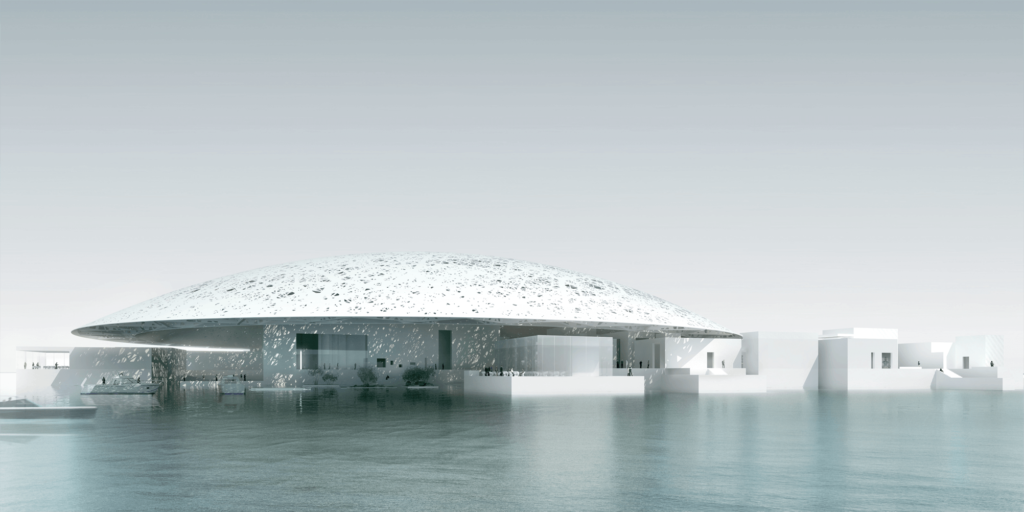 The University of Melbourne is prresenting a series of public lectures in the lead up to their study tour to the United Arab Emirates and State of Qatar. See more information about the study tour here.
The University of Melbourne is prresenting a series of public lectures in the lead up to their study tour to the United Arab Emirates and State of Qatar. See more information about the study tour here.
To book for any of the lectures or for further information see the website here.
Fully booked Monday, 21 August 2020 6.15pm–7.15pm
‘The Louvre Abu Dhabi and the Twenty-First Century Art Museum: From Agent of the West to Global Art Experience’
Presenter: Associate Professor Christopher Marshall
The Louvre Abu Dhabi is scheduled to open its doors to the public in November 2017 following ten years of planning and development. One of the most high profile and eagerly anticipated international museum projects of the past fifty years, this initiative has the potential to re-define what we mean by a public art museum in the 21st century. The modern art museum was launched during the Enlightenment as a space to ‘ennoble’ the citizens of the state by bringing them into contact with the great achievements of artistic and cultural expression. Though founded on the ideal of a supposedly ‘universal survey’ of culture, in practice this has always meant that museums have reinforced a peculiarly Western notion of cultural distinction from Ancient Greece through to the European Renaissance and so on. Now thanks to a ground breaking partnership between the Emirate of Abu Dhabi and the French Government, a new type of ‘universal museum’ is set to rise in the rapidly emerging cultural landscape of the United Arab Emirates. This lecture will seek to situate the Louvre Abu Dhabi project in its historical and museological contexts with a particular focus on the new concept of a ‘global vision of the history of world art’ that will be displayed within the galleries of Jean Nouvel’s Louvre Abu Dhabi when it opens at the end of this year.
Monday, 4 September 2020 6.15pm–7.15pm
‘Shifting Global Perspectives on the Private Art Museum: From Private Delectation to Public Benefit and Beyond’
Presenter: Dr Georgina Walker
The Barjeel Art Foundation in the United Arab Emirates (2010) belongs to a new model of private art museums that have emerged in the 21st century and indicate an acceleration of the privatisation of art and culture on a global scale. Founded by Sultan Sooud Al-Qassemi, it holds an extensive collection of Modern and Contemporary Arab Art, dating from the 1900s to the present day. The fast growing number of art collectors emerging in the Persian Gulf region and many parts of Asia, continue in an upward trajectory. This is due to a broader economic context, the growth in newly wealthy individuals, and the rapidly changing global centres of commerce, power and influence that are shifting away from the West. The continuing growth in the wealthy middle classes places greater emphasis on art collecting as an elite activity. Therefore we can expect to find increasingly more significant private museums and collections situated outside the West—hence the rise of private art museums in the Persian Gulf region and Asia. This lecture will seek to situate the Barjeel Art Foundation, and other cultural institutions of its type, within the global enterprise of the ‘private’ museum in this rapidly emerging cultural landscape. This will allow for a critical and informed examination of the history and future direction of the private museum and the relationship between private, public and corporate.
Tuesday, 12 September 2017, 6.15–7.15pm
An Architect’s Perspective on Cultural Developments in the Middle East
Presenter: Professor Donald Bates
For at least the last 150 years, almost all emergent nations and urban developments have sought to establish a cultural and social basis of their presence and value through the creation of cultural precincts and museums and galleries. Whether as receptacles of pre-existent and historically bound artefacts and artistic production, or for captured, plundered or purchased objet d’art and recent creations, the art museum/gallery remains as a powerful social instrument for cultural substantiation and political ambition.
The emergent cultures and new metropolises of the Gulf manifest this contemporary tendency, but with distinct variation and differences. Add to this the convincing economic pitch of the “Bilbao Effect” and enormous efforts and finances can be seen pouring into foundations and campaigns that are as much directed towards tourism as they are towards cultural edification. The ambitions, the intentions and the realisations of these projects (both the architectural object and the curatorial agenda) fluctuate with the price of oil, though the belief in the essential correctness of such efforts usually remains. Between Abu Dhabi, Dubai, Sharjah and on to Doha (much less to Saudi Arabia, Bahrain and Kuwait) there are an array of propositions, proposals and permutations to this tendency and its successful elaboration.
